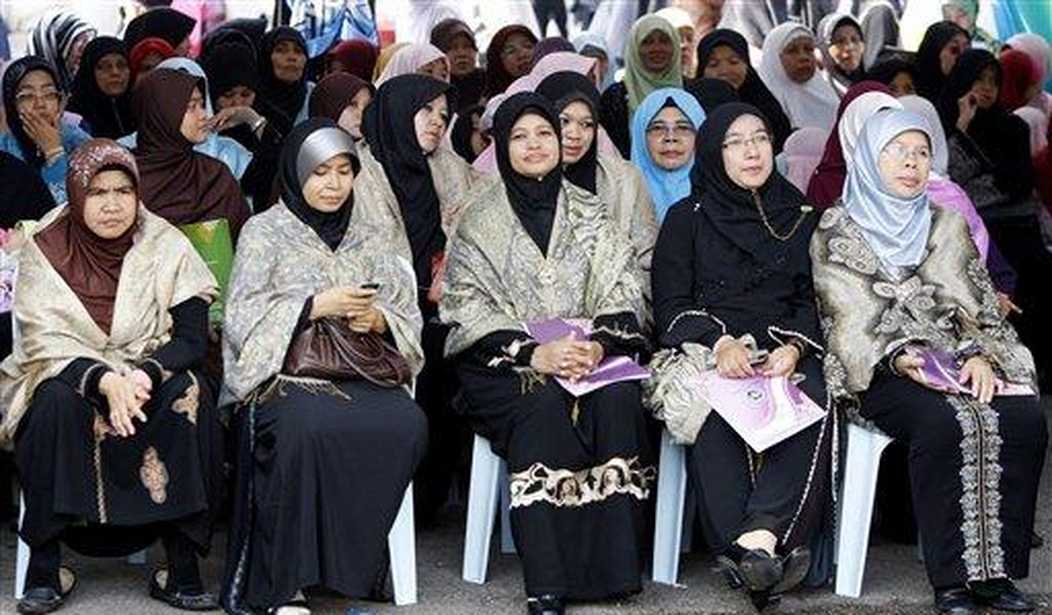The facts at hand presumably speak for themselves, but a trifle more vulgarly, I suspect, than facts even usually do. On Thursday evening in the Indian city of Muzaffarnagar, Hazra, the second wife of the Muslim cleric Maulvi Vakil Ahmad, pleaded with him not to take a third wife. The good Maulvi refused her pleas and went to sleep, whereupon, according to India Today, “Hazra cut off his manhood with a sharp-edged kitchen knife, due to which he ‘bled to death.’”
What a shame. Hazra will no doubt now face the full measure of the law, yet while her action cannot be excused, it can be understood. Polygamy destroys romance, and dehumanizes women, reducing them to the status of commodities. Is she the one, the only one, who has captured your heart, delighted your eyes, put a spring in your step and filled your heart with joy? No, she is just one in a series, and can be changed once you grow tired of her. The Qur’an tells Muslim men to “marry those that please you of women, two or three or four. But if you fear that you will not be just, then one.…” (Qur’an 4:3).
It seems fair: A man who cannot be just with multiple wives should restrict himself to just one, but in such matters, what constitutes just behavior is all too subjective and elusive. Islamic authorities have generally understood this to mean equal economic support and equal time in the beds of each.
Yet even if all this were scrupulously managed, an equal distribution of affection wouldn’t be possible. Islamic tradition records that even Muhammad favored his child bride Aisha over all of his other wives. A hadith has a Muslim making bold to ask him, “Who is the most beloved person to you?” Muhammad answered with one word: Aisha. (Bukhari 5.62.3662) What might his other wives have thought of this?
In contrast to this, the human heart longs to love and be loved uniquely, and this desire cannot be extinguished. In Constantinople: City of the World’s Desire, 1453–1924, Philip Mansel’s elegantly written history of Constantinople after the Muslim conquest, he offers a moving case in point involving the daughter of the sultan of the Ottoman Empire:
Yet even these most powerful and privileged of Ottoman society might be tortured by jealousy. Adile Sultan, daughter of the great nineteenth-century reformer Mahmud II, married an army officer, Mehmed Ali Pasha. They were in love. One day at the fashionable meeting-place in the Golden Horn called the Sweet Waters of Europe, she attracted his attention. Since she was thickly veiled, he did not know who she was. He dropped a scented handkerchief at her feet. That night the Pasha found the handkerchief on the pillow beside his sleeping wife.
One day, Adile Sultan traveled to a mosque far from her home. Taking advantage of the celebrated Oriental hospitality, she stopped for a rest at a mansion that was on the way. While enjoying coffee and sherbet set out by her hostess, she was astonished to find that her hostess, too, was the wife of Mehmed Ali Pasha.
She said nothing, however, and returned home — where, Mansel says, “thereafter she lived in seclusion, writing poems of increasing sadness. When she died in 1898, she was buried beside her husband. They never referred to his infidelity.” In Islamic terms, it wasn’t infidelity at all. But nonetheless, it gnawed at Adile Sultan’s heart.
It doesn’t take much knowledge of human nature to recognize that it’s a story that has been repeated and is still being repeated in polygamous households the world over. It has been repeated in the United States. In August 2007, a Muslim woman named Myra Morton shot her husband, Jereleigh, to death as he lay in his bed in their home near Philadelphia.
The Mortons had converted to Islam in the 1980s. Jereleigh Morton had recently taken a second wife in Morocco: Zahra Toural, 35. (The first Mrs. Morton was 47 at the time). According to the police, Jereleigh Morton met Zahra in December 2006, on the Internet, and got married in Morocco in March 2007. This made Myra Morton unhappy. She complained to friends that Jereleigh was “no longer paying attention to her,” but she felt as if she had to approve of his marriage to Zahra since it was sanctioned by Islamic law, and because it was what Jereleigh wanted. She wrote in her diary: “I go give him the permission, because he argues with me when I protest this marriage.” She even went to Morocco, according to police investigators, to “sanction it under Islamic law.”
Yet at the same time, she wrote to the State Department, urging officials not to allow Zahra Toural into the United States and accusing her of terrorist ties. Evidently, however, this letter had no effect, and in any case it couldn’t prevent Jereleigh from traveling to Morocco. So Myra Morton, desperate and deeply hurt, ultimately found a different solution.
Yet despite its obvious human cost, polygamy is heading West with Muslim migrants. Last April, the Swedish government proposed unexplained “exceptions” to its anti-polygamy law. In Germany in 2018, a Muslim migrant thanked “Mama Merkel” for being able to practice polygamy while receiving state benefits. And the New York Times reported back in March 2007 that “immigration to New York and other American cities has soared from places where polygamy is lawful and widespread, especially from West African countries like Mali, where demographic surveys show that 43 percent of women are in polygamous marriages.”
Related: Anti-Free Speech Muslim Group Sues Facebook for Not Removing Sites Opposing Jihad Violence
Muslims in America who practice polygamy don’t seem concerned about breaking “manmade” American law. Ibrahim Hooper of the Hamas-linked Council on American-Islamic Relations (CAIR) stated: “Islamic scholars would differ on whether one could do so while living in the United States.” He was not reported as having said anything about working against this practice among American Muslims, despite its illegality.
Meanwhile, feminists are mum. After all, heaven forfend that they say something that might be construed as “Islamophobic.”










Join the conversation as a VIP Member